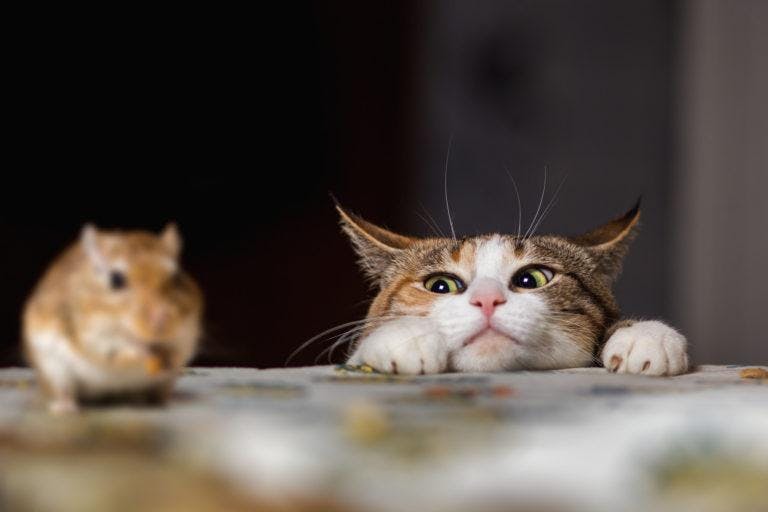Do you have a mighty cat hunter in your home too? Big cats are notorious for their hunting strategies & techniques in comparison to other mammalian predators.
And your little Simba uses the same chasing and killing styles as his wild ancestors. Read up on "How do cats hunt?"
Cat hunting: Predatory behavior
Evolution has lead cats to become highly specialized and successful hunters. They are physically and behaviorally completely adapted to the predator lifestyle. Feline digestive tract is specifically adapted to the digestion of meat-based diet. They are indifferent to the taste of sugars which is believed to be an evolutionary force that has driven cats to eat less plants and more meat. This would explain why we won’t see a wild cat supplementing its diet with fruits, roots and honey like bears and dogs. They do, however, occasionally take small amounts of grass to help their digestion.
Another advantageous adaptation are the premolar and first molar which form a carnassial pair on each side of the mouth – making it easier for the cat to shear meat. Feline tongue has distinctively sharp spines which not only assist them in grooming, but also help them rip meat. Their digestive tract is shortened too because they no longer need the long tract effective at digesting plants. Shorter digestive tracts is sufficient enough for them and it weighs them down a lot less. Hunting and chasing has also become central to the feline behavior patterns. All these evolutionary adaptations specialized these gracious animals into effective and successful hunters.
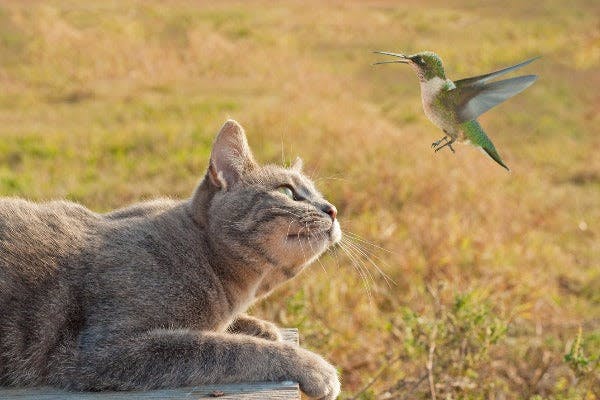
How do cats hunt?[/caption]
Why do cats hunt? Interestingly, despite many of our beliefs, it isn’t hunger that drives felines to hunt. Kittens have inborn hunting and chasing instincts and they earn their hunting skills through play. It is their mother cat who teaches them to kill in order to eat. The mom cat is the one to show her kittens that their prey is actually their food.
This is why your kitty may be an extraordinary mice killer but never shows an interest to actually tastes one. He learned to hunt but didn’t learn to eat his prey. Eating the prey is a learned behavior, and the hunger itself won’t teach your feline to do it.
"Cats don’t need to be hungry to hunt. It’s the sound and sight of moving prey that provides the stimulus to chase and capture, a hardwired behavior as natural to the cat as purring. That’s one reason kitten play aggression that grapples your moving ankles can prove so energetic and intense." - Amy Shojai, a certified cat & dog behavior consultant and the award-winning author of 30+ pet-centric books.
What drives well-fed domestic cats to hunt? While it is quite obvious why stray cats hunt, many feline researchers out there are still puzzled as to what exactly motivates the well-fed pets to continue to do so too. Several theories are explaining the possible reasons why they do this, of which we will mention the two of the most broadly accepted ones:
1. Animal trophy. Some opinion leaders and feline enthusiasts believe that cats sometimes hunt rodents, birds and invertebrates to present them as trophies to their humans. Although the motivation for such behavior remains a mystery, it can be speculated that this is a friendly bonding behavior pattern. The cat could be expecting to be praised for their "contribution to the peck."
According to the ethologist Paul Leyhausen, the author of "Cat Behavior", cats adopt us humans into their social group, their peck. They possibly even assume that humans go hunting when they’re gone for long periods of time over the day – they do always have plenty of food. And cats want to contribute to this peck – so they do. They proudly share their excess kill with you. If your cat has presented you with a live prey though, it is possible that they are gifting you with a special opportunity to practice your own hunting and killing skills. How valuable!
2. They are craving more meat. As mentioned above, cats are physically and socially completely adapted to the all-meat-based diet. Cats are obligate carnivores. They cannot not live on vegetarian diets as they are not able to synthesize certain nutrients absent in plant food (i.e. vitamin A, taurine and certain fatty acids). While domestic cats actually often do like vegetables and they gladly engage in supplementing their carnivorous diet with grass or similar plants, they generally prefer feeding on mostly meat. Branded food often contains large quantities of corn or rice alongside meat. This could be one of the explanation to why some well-fed domestic cats hunt and eat the prey of their choice.
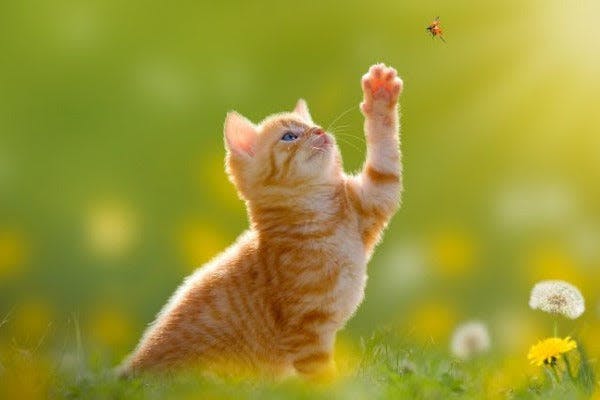
How do cats hunt?
How do kittens develop their hunting skills? They play. Through their little games, kittens develop their coordination and learn how to stalk a captured object and adjust their own speed to its moving speed. They stalk, ambush and chase other kittens and learn the fundamentals of hunting together. Their mother shows them that they can and should eat their prey too. She brings the dead prey to her litter and starts eating it in front of her kittens to encourage them to join in. Eventually, the kittens learn to eat the prey on their own whenever the mother cat brings it to them.
After they’ve mastered this skill, the mother starts bringing partially dead prey to her kittens to give them an opportunity to practice their killing skills. After a while, once the kittens learn how to catch and kill, they can start accompanying their mother in her hunts and watch her in order to learn how to hunt and kill completely on their own.
Feline hunting techniques
There are several described techniques felines adopt while hunting, depending on the prey they seek. Two of them are most popularly and broadly described in literature:
1. Stalk and pounce technique. This is a broadly observed technique in cats. But don’t be fooled. It required a lot of skills and patience. In the first step, the cat locates its prey. Then it stalks it, slowly moving closer in the ground pose. They often stop and freeze, silently observing their prey.
If the prey moves away, the cat slowly moves closer, adjusting its moving speed to the moving speed of the prey. They remain as silent as they can, sometimes freezing with a paw in mid-air, just to avoid being revealed. When ready to run after it, they gather their hind paws beneath and prepare for the mighty take-off.
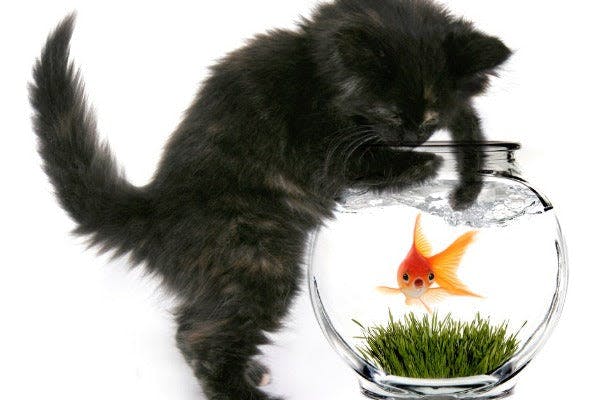
How do cats hunt?
2. Fishing technique. Fishing is a tough skill to master. It requires patience and there is, of course, the visual difficulty regarding the water. The cat tries to keep its reflection away from the water and waits for the prey. When ready, they quickly hook their paw into the water to scoop the prey out. Sometimes they will wade and use both paws to catch the fish. This technique has also been observed in cats fishing something out of a hole on dry-land.
Killing technique
"Cats kill by biting the neck where the skull joins the spine, severing the vertebrae with the dagger-like canine teeth. They grasp the neck and use a "chattering" movement to position their bite accurately. In fact, cats frustrated in the hunt (i.e., watching from a window as squirrels play outside) often exhibit this chattering behavior which is actually the killing bite, in reaction to seeing out-of-reach prey." - explains Shoija. After the animal has died, the cat either loses the interest or carries the prey to a safe area where they can eat it. Or they’ll gift it to you. Because they are that sweet.
Fun facts about cat hunting:
1. Head level. While chasing prey, cats keep their head level still. Humans and dogs bob their heads up and down.
2. They don’t rely on the sense of smell as much. Unlike other predators, cats heavily rely on sight and hearing to locate and stalk their prey rather than smell.
3. Hunt and play. Cats don’t play with their prey because they’re cruel. They are simply practicing their skills or testing how dangerous their prey really is. Socialized felines have also learned to inhibit their bite through play with humans and other pets. Playing with the prey helps them build up the necessary excitement they’re missing out on.
4. Post-hunt grooming. Cats often take a moment to groom themselves right after hunting and before claiming their prize. This is so they would recover from the thrill and excitement of the hunt. By grooming, they balance their emotional equilibrium.
5. They mimic their prey. Cats have been documented to actually make similar noises to the prey they’re stalking right before they pounce. It is still unexplained to why exactly they do this, but they are plenty of adorable videos of this behavior pattern out there, like this one!
6. Do all cats really hunt? Even though some indoor cats may never experience the real thrill of a hunt outdoors, yes, all cats do have the inborn hunting instinct. Maybe your cat is hunting the dust rags or your ankles. A superior hunter nonetheless.
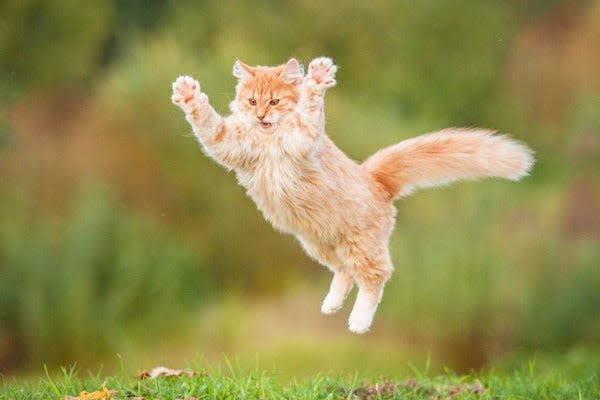
How do cats hunt?
How mighty is the hunter in your home? What kind of gifts did your beloved bundles present you? Share your hunting experiences with us! We cherish everything we can learn from you and your gracious felines.
